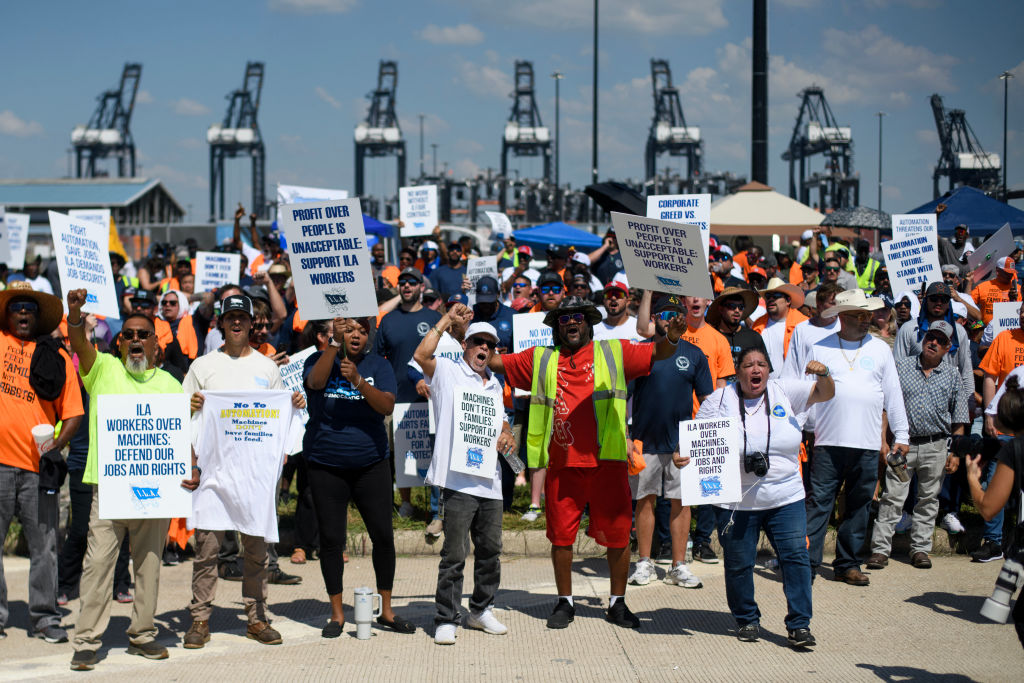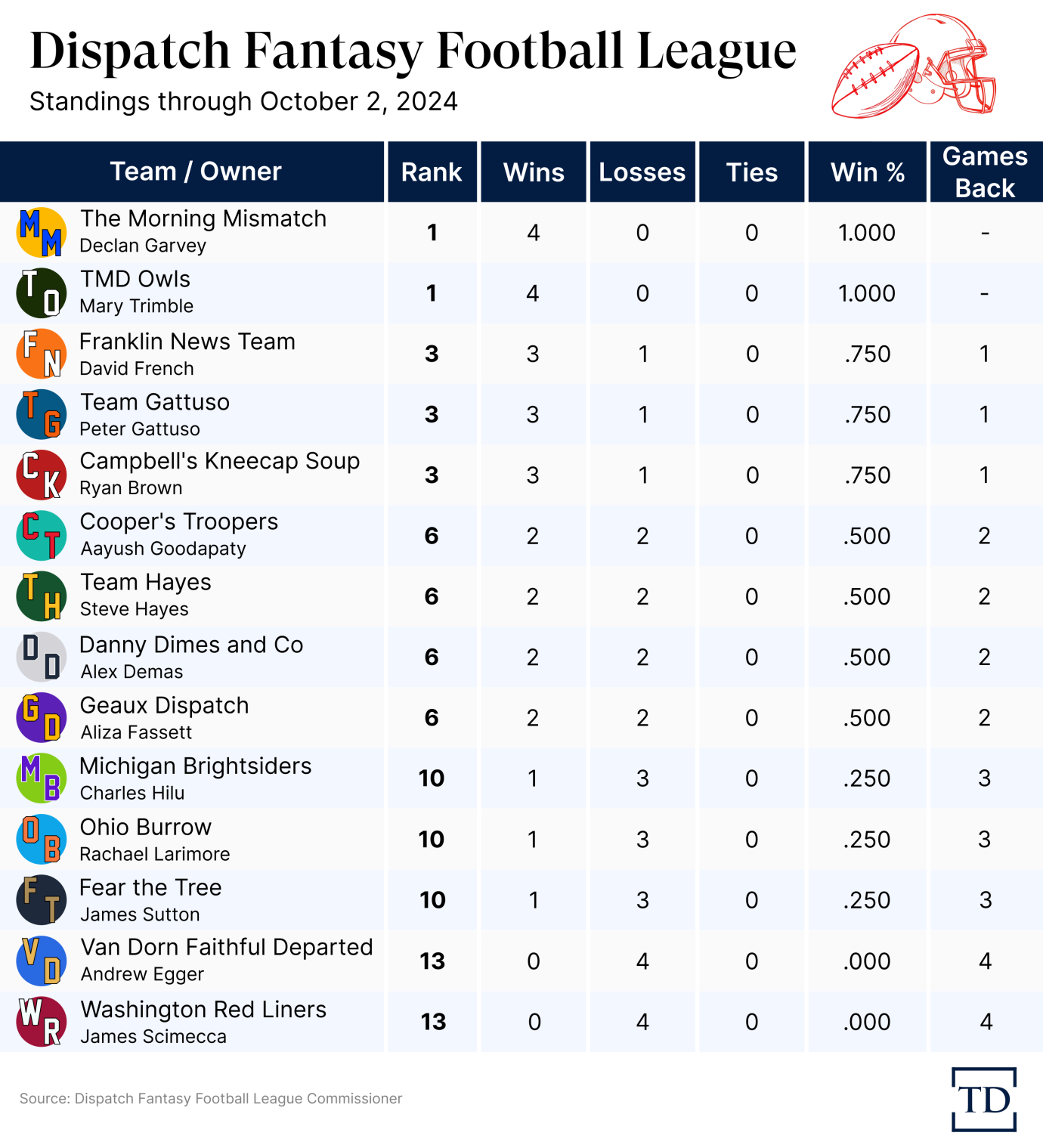Happy Friday! We regret to inform you that Fat Bear Week has been delayed because one of the contestants mauled another one to death in a river on a widely viewed live-stream feed.
When we said Monday that the contest “pits them against each other in a battle to crown the chonkiest bear,” we didn’t mean literally.
Quick Hits: Today’s Top Stories
- The International Longshoremen’s Association (ILA) on Thursday evening announced it was suspending its strike until January 15, pending a deal with the group representing the port owners, United States Maritime Alliance (USMX). The strike, which began Tuesday, sent some 45,000 dockworkers to the picket lines and shuttered 36 ports from Texas to Maine over a dispute with port owners over a new six-year contract. The two parties reportedly agreed, albeit tentatively, to a 62 percent wage hike over six years, a figure below the 77 percent the ILA sought. The ILA is still pushing the USMX to functionally ban automation at the ports.
- The new NATO Secretary-General Mark Rutte on Thursday met with Ukrainian President Volydmyr Zelensky in Kyiv, Ukraine, and called for further support for Ukraine in its defense against Russia’s invasion, particularly emphasizing the need for continued weapons shipments. Rutte, a former Dutch prime minister making his first trip to Ukraine since he took over as the NATO chief this month, said he would prioritize increasing industrial production of arms to boost the weapons stockpiles for both Ukraine and NATO member states.
- Meanwhile, Ukraine’s military announced on Thursday that it had destroyed a Russian radar station in an undisclosed location using U.S.-provided long-range ballistic missiles. The strike will make it more difficult for Russia to “detect, track, and intercept” aerial targets within a particular geographical airspace region, Ukraine’s military claimed. U.S. policy for use of the long-range Army Tactical Missile Systems (ATACMS) sets geographical limits on how deep Ukraine can strike in Russian territory.
- Ukraine’s military also reported that more than 100 Russian drones attacked 15 Ukrainian regions on Wednesday night, saying the attacks targeted residential and energy infrastructure. However, Russian-state media reported the Russian defense ministry as saying that the attack targeted only energy facilities used by Ukraine’s military. The Ukrainian military claimed it shot down more than 75 of the drones.
- The Israel Defense Forces (IDF) announced on Thursday its air force attacked terrorist infrastructure used by Hezbollah—the Iran-backed, Lebanon-based terrorist organization—in the area of Lebanon’s capital city of Beirut overnight. Lebanese government authorities reported nine dead and 14 others injured from the attack. The IDF said it took measures to “reduce harm to those not involved,” targeting terrorist sites, including intelligence headquarters and munitions production and storage facilities. Meanwhile, Israel issued additional evacuation orders on Thursday to residents of more than 20 towns in southern Lebanon as the IDF continues with its ground operations in the region.
- The United Kingdom announced on Thursday it had agreed to relinquish sovereignty of the Chagos Islands—an archipelago in the Indian Ocean—to the east African island nation of Mauritius in return for continued control of the island’s Diego Garcia military base, a facility jointly operated by the U.K. and U.S. The Chagos Islands have been under British control since 1814, and the U.K.—in building an airbase on Diego Garcia in the early 1970s—expelled nearly all of the island’s 2,000 indigenous residents. Thursday’s deal may open up the possibility of Chagossians returning to the island. President Joe Biden championed the U.K-Mauritius deal on Thursday as an “historic agreement.”
- The U.S. Department of Homeland Security on Thursday banned imported goods from two separate Chinese companies—one that manufactures steel and another that produces artificial sweeteners and other food additives—for their alleged connections with forced labor practices. The move to ban the two companies—under the auspices of the Uyghur Forced Labor Prevention Act (UFLPA), a federal law passed with bipartisan support in 2021 to clamp down on forced labor practices in China—brings the number of entities barred from importing to the U.S. for forced labor ties under the UFLPA to 75 in total.
- The Mexican government’s defense ministry stated on Wednesday that at least six migrants were killed and 10 others injured in southern Mexico near its border with Guatemala on Tuesday after Mexican soldiers mistakenly opened fire at a group of migrants, mistaking the group for a criminal gang. According to a statement from Mexican defense officials, the two soldiers responsible—who have since been removed from military duty, placed under investigation, and could face legal repercussions—shot at the migrants’ vehicle after military personnel had reported explosions, adding their vehicle was similar to models commonly used by criminal groups. Mexican President Claudia Sheinbaum, who began her presidential term on Tuesday, said the deceased migrants had originated from Egypt, El Salvador, and Peru.
‘I’ll’—Very Briefly—‘Cripple You’

Harold Daggett, the leader of the International Longshoreman’s Association (ILA), had a warning for President Joe Biden or any other politician who opposed the ILA’s strike: “In today’s world, I’ll cripple you,” he said at a recent rally. He was convinced that Americans were about to learn that there is, in fact, power in a union: “They won’t be able to sell cars. They won’t be able to stock malls. They won’t be able to do anything in this country without my f—ing people. And it’s about time they start realizing it.”
Or not—at least until January 15.
The 45,000 longshoremen—or dockworkers—who walked off the job on Tuesday, closing 36 ports from Maine to Texas for three days, announced late Thursday that they had suspended their strike, allowing time to reach a deal on a new contract.
The ports’—which move 68 percent of all containerized exports and 56 percent of containerized imports—shutdown had threatened to snarl supply chains, raise the prices of many goods, and introduce significant disruption into the American economy shortly before the election on November 4. Instead, the ports will be humming again today as the two sides reached a tentative agreement on wages—enough to induce the longshoremen to go back to work.
Democrats, staring down the barrel of the tightest election in modern history as functional incumbents, are likely relieved. President Joe Biden released a statement late last night congratulating the two sides on getting closer to a deal: “I want to applaud the International Longshoremen’s Association (ILA) and the United States Maritime Alliance for coming together to reopen the East Coast and Gulf ports,” he said. “Today’s tentative agreement on a record wage and an extension of the collective bargaining process represents critical progress towards a strong contract.”
The strike had been building for quite some time as the deadline approached for the ILA and the U.S. Maritime Alliance (USMX), representing the owners of the various ports in question, to reach an agreement on a new six-year contract. Citing the impacts of inflation on its members—as well as concerns about the automation of port systems—the ILA had rejected the USMX’s final offer, which included a nearly 50 percent wage increase, tripled employer contributions to retirement plans, and contained negative language about the automation of ports.
Daggett had set his sights higher: a 77 percent wage increase, which would bring the base rate of pay for an ILA dockworker to $69 an hour—though there’s variation in pay above and below that rate based on seniority, location, and other factors.
But, even as a final agreement still seems a ways off, the two sides did manage to find common ground on hourly wages. The USMX has reportedly offered to increase hourly wages by 62 percent over a six-year period, which the ILA said in a statement was sufficient to suspend the strike until January 15, a pause during which both sides would “return to the bargaining table to negotiate all other outstanding issues.”
The question of automation, though, remains a sticking point. The current contract includes the provision that there “shall be no implementation of semi-automated equipment or technology/automation until both parties agree to workforce protections and staffing levels.” U.S. ports already tend to be less automated than their international peers: A Government Accountability Office report from March found that while the 10 largest U.S. container ports had implemented some form of automation, such as automated gate systems or cargo handling equipment, they were generally less automated than major ports in China and Europe.
But American labor unions have staunchly opposed automation, fearing that it comes at the expense of union jobs. In a statement on Tuesday, the ILA demanded “absolute airtight language that there will be no automation or semi-automation”—a functional ban.
A protracted strike would have threatened to raise prices for imported goods and hurt exporters. “You’ve seen the ILA threaten these strikes for about a year now,” said Christine McDaniel, a senior research fellow at the Mercatus Institute and the former senior trade economist on President George W. Bush’s White House Council of Economic Advisors. To some extent, she said, retailers have already been “pricing it in,” making it unlikely to have “immediate impacts,” speaking before the deal was announced.
But certain industries could have been more affected than others by a strike, such as the imports and exports of fresh fruits, groceries, and meats. With grocery stores already operating at a profit margin in the 1 to 2 percent range, retailers would be “pretty tight in terms of ability to absorb these price increases,” McDaniel told TMD, speaking before the ILA suspended the strike. She offered a rough rule of thumb for when consumers might feel the effect on grocery prices: “If this goes on for less than a month, minimal price increase. If it goes on more than a month, then we’re probably looking at higher price increases.”
Had the strike continued, Biden was adamant that he was not interested in using the powers of the federal government to bring about a quicker resolution. It is, however, within his power to do so: The Labor Management Relations Act of 1947, better known as the Taft-Hartley Act, allows the president to suspend a strike that may, broadly, “imperil the national health and safety” for a provisional 80-day period during which the two sides must make “every effort” to reach a deal.
Taft-Hartley has been invoked 37 times since its passage, with the two sides reaching a deal around half of the time, but it has long been detested by organized labor and its allies.
Biden, who has frequently called himself the “most pro-labor president in American history,” said last Sunday that the dispute was simply “collective bargaining,” adding, “I don’t believe in Taft-Hartley.” But Transportation Secretary Pete Buttigieg, Acting Labor Secretary Julie Su, and economic advisor Lael Brainard were tasked with attempting to keep the negotiations going ahead of Thursday night’s deal.
The agreement is a partial victory for Daggett, who is, to say the least, a colorful character. A raspy-voiced, sturdily built man who came up as a dockworker himself, he is an exemplar of how the label “working class” can often obscure more than it reveals. Dagget’s combined salary last year as president of the ILA and president emeritus of a local union came in at more than 1 million dollars. He lives in a 7,000-square-foot mansion in Sparta, New York.
In 2005, he stood trial in Brooklyn on wire and mail fraud charges, allegedly for steering union contracts toward firms who paid kickbacks to organized crime outfits—an accusation he’s vehemently denied. One of the other defendants in the trial, Lawrence Ricci—accused of being a member of the Genovese crime family—was later found dead in the trunk of a car outside of a New Jersey diner.
The ILA has not made an endorsement in the presidential race, though Daggett has expressed warm feelings, if not full-throated support, for Donald Trump in the past. In a July post on the ILA’s website responding to the attempted assassination of the former president at a Pennsylvania rally, Daggett recalled “a wonderful, productive 90-minute meeting where I expressed to President Trump the threat of automation to American workers,” in November 2023. “President Trump promised to support the ILA in its opposition to automated terminals in the U.S.,” Daggett added.
William Brucher, a professor of labor studies and employment relations at Rutgers University, told TMD that the ILA also likely realized they had significant leverage when Biden swore off using Taft-Hartley, particularly given that the election is just over a month away. “I’m sure they realized Biden wouldn’t alienate organized labor with Harris’ election on the line,” he said—speaking of Vice President Kamala Harris—following the announcement of a deal.
The two presidential campaigns have responded differently to the strike. On Wednesday, Harris threw her support fully behind the dockworkers. “This strike is about fairness,” she said. “Foreign-owned shipping companies have made record profits and executive compensation has grown. The longshoremen, who play a vital role transporting essential goods across America, deserve a fair share of these record profits.”
Democrats are likely driven by both pro-union convictions and the need to maintain party cohesion, said Brucher before the deal was announced. “Who’s going to turn out voters in swing states?” he told TMD. “In 2020 and in previous election cycles where the Democrats have won, organized labor is the biggest force that can put boots on the ground, coordinate them, and reach out to constituency voters.”
For his part, Trump had declined to fully endorse either side of the dispute. “You know those workers, some people would be upset with them, and some people not,” he told reporters on Wednesday. “But those workers were very badly hit with inflation, and, you know, they’re not happy, and they do a good job.”
Trump has, at least rhetorically, attempted to cultivate better ties with organized labor than other recent Republican presidential contenders. Sean O’Brien, the president of the Teamsters Union, addressed the GOP convention in Wisconsin this summer, though not without some controversy among the Teamsters themselves. The union declined to endorse either candidate for president.
Some GOP politicians took a harder line as the strike seemed set to wear on. Florida Gov. Ron Desantis announced on Thursday that he would send National and State Guard units to Florida ports impacted by the strike “to maintain order and, where possible, resume operations.”
“Disrupting the distribution of food, equipment, and supplies as the Southeast U.S. recovers from Hurricane Helene is unacceptable,” he said.
Biden praised the parties on Thursday for removing the blocks on Helene recovery supplies. “I want to thank the union workers, the carriers, and the port operators for acting patriotically to reopen our ports and ensure the availability of critical supplies for Hurricane Helene recovery and rebuilding,” he said.
The new deadline for negotiations is set for well past the election, removing the major political considerations of a work stoppage that could have crippled dozens of U.S. ports. Asked about the deal by reports Thursday evening, Biden said, “We’ve been working hard on it. With the grace of God, it’s going to hold.”
Worth Your Time
- There’s a merry band of sleuths digging into the evidence that underpins scientific research. “Some are into exposing statistical skullduggery; others are into spotting manipulated images,” Jessica Wapner reported for Undark. “Some are academics sticking to their field; others more general-interest vigilantes. But all of them are entrenched in an ongoing battle at the heart of science, in which the pressure to publish and the drive for fame and profit have thrown countless images and statistics into question, sometimes cracking pillars of research in the process. The issue is spread across many fields of science, though some have suffered more than others.”
- Does a free-market, capitalist economy erode social trust? Writing in Law & Liberty, Walker Wright argued it has the opposite effect. “What makes a market actor competitive is the ability to identify and supply the wants and needs of society through persuasion,” he wrote. “The entire process of market competition consists of discovering ways to serve society, persuading others to trust that you can serve them well, stewarding resources wisely in the name of that service, and then delivering satisfactory results. To be competitive in the market is to be trustworthy. The entire process is a trust-building exercise.”
Presented Without Comment
New York Times: Photos Show New York Congressman [Mike Lawler] in Blackface as Michael Jackson
The images, taken around October 2006, show a 20-year-old Mr. Lawler at a campus social gathering dressed as Michael Jackson. He is wearing a black shirt and a red jacket and, in one photo, is striking a signature Jackson dance pose. His face has also been visibly darkened.
…
In 2005, as a high school senior, Mr. Lawler flew from New York to California to attend parts of Jackson’s criminal trial. The pop star had been charged with molesting a 13-year-old boy at his Neverland Ranch; the case ended in acquittal.
J. Randy Taraborrelli, a Jackson biographer, helped get Mr. Lawler into the courtroom and recalled in his book that the young fan had been “so disgusted” by testimony against Jackson “that he couldn’t help but mutter something derogatory under his breath.” Mr. Lawler was removed from the courtroom, according to Mr. Taraborrelli’s biography, “Michael Jackson: The Magic, the Madness, the Whole Story.”
Also Presented Without Comment
Mediaite: [Former GOP Speaker] Kevin McCarthy Says ‘I Don’t Hang Around with Pedophiles’ When Asked If He’s Made Amends with [Florida Republican Rep.] Matt Gaetz
Also Also Presented Without Comment
Former President Donald Trump on Thursday:
They stole the FEMA money like they stole it from a bank so they could give it to their illegal immigrants that they want to have vote for them this season.
In the Zeitgeist
With football season now a month old, we thought we’d give you a little look behind the curtain at The Dispatch’s office (plus old friends) fantasy football league. The timing of this decision to publish the standings has nothing at all to do with the fact that Mary and Declan are tied for first place, are facing off this weekend, and have an even chance of winning, according to the ESPN fantasy app.

Toeing the Company Line
- In the newsletters: The Dispatch Politics team reported on Republicans’ evasiveness on whether Trump lost the 2020 election, Mike and Sarah explained the new details revealed in special counsel Jack Smith’s unsealed brief against former President Donald Trump, and Nick compared Liz Cheney and Nikki Haley to explore what they can tell us about the state of the GOP.
- On the podcasts: Sarah and Jonah were joined by Mike Pesca of “The Gist” podcast to discuss this week’s vice presidential debate on this week’s Dispatch Podcast roundtable.
- On the site: Mitch Kokai reports on the political implications of Hurricane Helene, and Gil Guerra pens an explainer on how we should interpret the ICE’s figures about non-detained illegal immigrants with criminal records.
Let Us Know
Were you expecting the ILA strike to end so quickly? Should U.S. ports pursue more automation?












Please note that we at The Dispatch hold ourselves, our work, and our commenters to a higher standard than other places on the internet. We welcome comments that foster genuine debate or discussion—including comments critical of us or our work—but responses that include ad hominem attacks on fellow Dispatch members or are intended to stoke fear and anger may be moderated.
With your membership, you only have the ability to comment on The Morning Dispatch articles. Consider upgrading to join the conversation everywhere.